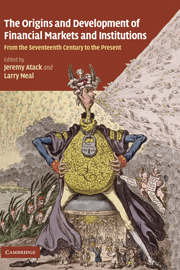 The Origins and Development of Financial Markets and Institutions
The Origins and Development of Financial Markets and Institutions Published online by Cambridge University Press: 04 August 2010
Le problème clef, c'est de savoir pour quelles raisons un secteur de la société d'hier que je n'hésite pas à qualifier de capitaliste, a vécu en système clos, voire enkysté; pourquoi il n'a pas pu essaimer facilement, conquérir la société entière.
(Fernand Braudel, Civilisation matérielle, économie et capitalisme, Volume 2: Les Jeux de l'échange), p. 289In our opening quotation, Fernand Braudel likens the development of early modern capitalism to a process occurring inside a “bell jar:” insulated from the rest of the economy and unable to expand to the whole society. The key question for him was to understand why, although the main elements of modern capitalism were already present in the Commercial Revolution, it took so long, until the Industrial Revolution, for capitalism to “conquer” society, and become the dominant organizational mode in the West.
Braudel's puzzle has much relevance for modern development economists. Recently, Hernando de Soto suggested that the bell jar metaphor fairly characterizes today's global financial system. During the past twenty-five years, he argues, many countries have formally opened up to global capital flows, but we still need to see the extreme efficiency displayed by New York's sophisticated financial markets benefit the poor rural areas of Peru, Niger, or India, where credit markets are shallow and interest rates remain high. The implication is that capitalism may thrive in certain areas without inducing rapid progress in other areas. This “Braudelian” puzzle is called by de Soto the “mystery of capital.”
To save this book to your Kindle, first ensure no-reply@cambridge.org is added to your Approved Personal Document E-mail List under your Personal Document Settings on the Manage Your Content and Devices page of your Amazon account. Then enter the ‘name’ part of your Kindle email address below. Find out more about saving to your Kindle.
Note you can select to save to either the @free.kindle.com or @kindle.com variations. ‘@free.kindle.com’ emails are free but can only be saved to your device when it is connected to wi-fi. ‘@kindle.com’ emails can be delivered even when you are not connected to wi-fi, but note that service fees apply.
Find out more about the Kindle Personal Document Service.
To save content items to your account, please confirm that you agree to abide by our usage policies. If this is the first time you use this feature, you will be asked to authorise Cambridge Core to connect with your account. Find out more about saving content to Dropbox.
To save content items to your account, please confirm that you agree to abide by our usage policies. If this is the first time you use this feature, you will be asked to authorise Cambridge Core to connect with your account. Find out more about saving content to Google Drive.